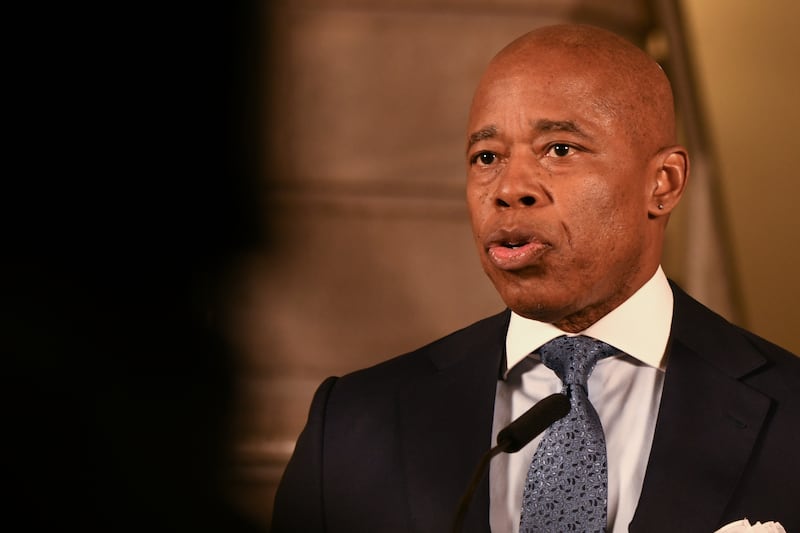 of a man in a dark suit jacket with a white shirt and blue tie" width="5152" height="3434" />
of a man in a dark suit jacket with a white shirt and blue tie" width="5152" height="3434" /> of a man in a dark suit jacket with a white shirt and blue tie" width="5152" height="3434" />
of a man in a dark suit jacket with a white shirt and blue tie" width="5152" height="3434" />
Mayor Eric Adams unveiled on Thursday his newly appointed members to New York City’s Panel for Educational Policy, which has grown significantly in response to an updated state law.
Adams appointed six new people to the newly expanded panel that signs off on major education department contracts and school closures or co-locations. State lawmakers last year required the panel’s expansion from 15 to 23 members when they granted Adams another two years of controlling the nation’s largest school system, in hopes of bringing more parent voice to the body.
Those state-level changes called for the panel to grow from nine to 13 mayoral appointees. Four of these members must be public school parents, with at least one parent of a child with a disability, one with a child who is in a bilingual or English as a new language program, and one parent with a child in a District 75 school, which serves students with disabilities that require intensive support.
The new law also required the presidents of the city’s 32 parent councils to elect five members representing each borough — four more than currently serve. The city’s borough presidents continued to have their previously allotted number of five appointees.
One of the mayor’s new picks already raised eyebrows: Khari Edwards was ousted from his role as a governor’s aide in 2009 after the state found him “immature and irresponsible,” and accused him of lying in testimony for an inspector general investigation, according to the Daily News.
A City Hall spokesperson defended Edwards, calling him “not only a dedicated public servant, but, more importantly, a caring parent of three, who has continued to demonstrate his commitment to New Yorkers since these allegations surfaced over a decade ago.”
Edwards, who has since launched One Brooklyn Health and It Starts Here as the vice president of external affairs at Brookdale University Hospital, “has a strong track record of serving his community,” the spokesperson said in a statement after this story initially published.
Adams made a previous misstep with a panel appointment: last year he tapped Staten Island pastor Kathlyn Barrett-Layne but quickly withdrew the choice after the Daily News reported she had a history of anti-gay comments.
Two of Adams’ previous appointees, Kyle Kimball and Karina Taveras, were not reappointed, according to a spokesperson for City Hall, who declined to say why.
Additionally, the council presidents only elected four members instead of the required five. The Staten Island seat “remained vacant” during the election process, according to a City Hall spokesperson. Typically, such vacancies must be filled within 60 days by another vote from parent council presidents in that specific borough, according to the chancellor’s regulations.
In this case, there is only one parent council in Staten Island, so its president will appoint someone to the position. (Parents can nominate themselves by sending their information to the education department’s Office of Family and Community Engagement, which will forward eligible applications to the council president.)
With the expansion, the mayor’s appointees still make up a majority of the panel, which is often seen as a “rubber stamp” of the administration’s policies since mayoral appointees typically vote in favor of the administration’s proposals. Last year, dissenting voices were typically from the borough president appointees, as well as the panel’s elected member, Tom Sheppard, who has been reelected to the panel. One such vote — which was in part the result of the mayor failing to appoint enough of his members in time — was the panel’s rejection of the city’s funding formula.
Under this new configuration, it’s possible the public will see more disagreement among members. For instance, members elected by the parent councils and borough president appointees could potentially band together against certain policy proposals, such as school closures or co-locations. But their votes would still fall short of the mayor’s majority.
Also as part of the state’s changes last year, the panel must consider changes to school utilization, including co-locations and closures, in the borough of that school. That may lead to more frequent panel meetings. The panel, which typically meets once a month, has scheduled two meetings each in January and February.
Below is a list of the new panel. Those in bold are new:
Reema Amin is a reporter covering New York City schools with a focus on state policy and English language learners. Contact Reema at ramin@chalkbeat.org.